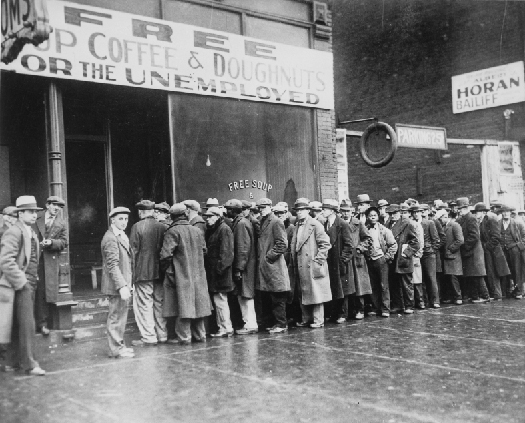| << Chapter < Page | Chapter >> Page > |
The
Great Depression of the 1930s brought economic hardships the nation had never witnessed before (
[link] ). Between 1929 and 1933, the national unemployment rate reached 25 percent, industrial output dropped by half, stock market assets lost more than half their value, thousands of banks went out of business, and the gross domestic product shrunk by one-quarter.

Cooperative federalism was born of necessity and lasted well into the twentieth century as the national and state governments each found it beneficial. Under this model, both levels of government coordinated their actions to solve national problems, such as the Great Depression and the civil rights struggle of the following decades. In contrast to dual federalism, it erodes the jurisdictional boundaries between the states and national government, leading to a blending of layers as in a marble cake. The era of cooperative federalism contributed to the gradual incursion of national authority into the jurisdictional domain of the states, as well as the expansion of the national government’s power in concurrent policy areas.
The
New Deal programs President Franklin D.
Roosevelt proposed as a means to tackle the Great Depression ran afoul of the dual-federalism mindset of the justices on the Supreme Court in the 1930s. The court struck down key pillars of the New Deal—the
National Industrial Recovery Act and the
Agricultural Adjustment Act , for example—on the grounds that the federal government was operating in matters that were within the purview of the states. The court’s obstructionist position infuriated Roosevelt, leading him in 1937 to propose a court-packing plan that would add one new justice for each one over the age of seventy, thus allowing the president to make a maximum of six new appointments. Before Congress took action on the proposal, the Supreme Court began leaning in support of the New Deal as Chief Justice Charles Evans
Hughes and Justice Owen
Roberts changed their view on federalism.
In
National Labor Relations Board (NLRB) v. Jones and Laughlin Steel ,

Notification Switch
Would you like to follow the 'American government' conversation and receive update notifications?